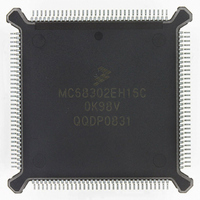MC68302EH16C Freescale Semiconductor, MC68302EH16C Datasheet - Page 62

MC68302EH16C
Manufacturer Part Number
MC68302EH16C
Description
IC MPU MULTI-PROTOCOL 132-PQFP
Manufacturer
Freescale Semiconductor
Datasheets
1.MC68302AG20C.pdf
(4 pages)
2.MC68302AG20C.pdf
(2 pages)
3.MC68302AG20C.pdf
(13 pages)
4.MC68302EH16C.pdf
(481 pages)
Specifications of MC68302EH16C
Processor Type
M683xx 32-Bit
Speed
16MHz
Voltage
5V
Mounting Type
Surface Mount
Package / Case
132-MQFP, 132-PQFP
Controller Family/series
68K
Core Size
32 Bit
Ram Memory Size
1152Byte
Cpu Speed
16MHz
No. Of Timers
3
Embedded Interface Type
SCP, TDM
Digital Ic Case Style
PQFP
Rohs Compliant
Yes
Family Name
M68000
Device Core
ColdFire
Device Core Size
32b
Frequency (max)
16MHz
Instruction Set Architecture
RISC
Supply Voltage 1 (typ)
5V
Operating Temp Range
0C to 70C
Operating Temperature Classification
Commercial
Mounting
Surface Mount
Pin Count
132
Package Type
PQFP
Lead Free Status / RoHS Status
Lead free / RoHS Compliant
Features
-
Lead Free Status / Rohs Status
RoHS Compliant part
Electrostatic Device
Available stocks
Company
Part Number
Manufacturer
Quantity
Price
Company:
Part Number:
MC68302EH16C
Manufacturer:
Freescale Semiconductor
Quantity:
135
Company:
Part Number:
MC68302EH16C
Manufacturer:
PANA
Quantity:
99
Company:
Part Number:
MC68302EH16C
Manufacturer:
Freescale Semiconductor
Quantity:
10 000
Part Number:
MC68302EH16C
Manufacturer:
FREESCALE
Quantity:
20 000
Company:
Part Number:
MC68302EH16CB1
Manufacturer:
Freescale Semiconductor
Quantity:
10 000
Company:
Part Number:
MC68302EH16CR2
Manufacturer:
Freescale Semiconductor
Quantity:
10 000
- MC68302AG20C PDF datasheet
- MC68302AG20C PDF datasheet #2
- MC68302AG20C PDF datasheet #3
- MC68302EH16C PDF datasheet #4
- Current page: 62 of 481
- Download datasheet (2Mb)
System Integration Block (SIB)
External Cycle Steal
3.1.4.5 Block Transfer Termination
The user may stop the channel by clearing STR. Additionally, the channel operation can be
terminated for any of the following reasons: transfer count exhausted, external device termi-
nation, or error termination. This is independent of how requests are generated to the IDMA.
Transfer Count Exhausted
3-12
DREQ input to the IDMA is level-sensitive and is sampled at certain points to determine
when a valid request is asserted by the device. The device requests service by asserting
DREQ and leaving it asserted. In response, the IDMA arbitrates for the system bus and
begins to perform an operand transfer. During each access to the device, the IDMA will
assert DACK to indicate to the device that a request is being serviced. If DREQ remains
asserted when the IDMA completes the peripheral cycle (the cycle during which DACK is
asserted by the IDMA) one setup time (see specification. 80) before the S5 falling edge
(i.e., before or with DTACK), then a valid request for another operand transfer is recog-
nized, and the IDMA will service the next request immediately. If DREQ is negated one
setup time (see specification 80) before the S5 falling edge, a new request will not be rec-
ognized, and the IDMA will relinquish the bus.
For external devices that generate a pulsed signal for each operand to be transferred, the
external cycle steal mode uses DREQ as a falling edge-sensitive input. The IDMA will re-
spond to cycle-steal requests in the same manner as for all other requests. However, if
subsequent DREQ pulses are generated before DACK is asserted in response to each
request, they will be ignored. If DREQ is asserted after the IDMA asserts DACK for the
previous request but one setup time (see specification 80) before the S5 falling edge, then
the new request will be serviced before the bus is relinquished. If a new request has not
been generated by one setup time (see specification 80) before the S5 falling edge, the
bus will be released to the next bus master.
When the channel begins an operand transfer, if the current value of the BCR is one or
two (according to the operand size in the CMR), DONE is asserted during the last bus cy-
cle to the device to indicate that the channel operation will be terminated when the current
operand transfer has successfully completed. In the memory to memory case, DONE is
asserted during the last access to memory (source or destination) as defined by the ECO
bit. When the operand transfer has completed and the BCR has been decremented to ze-
ro, the channel operation is terminated, STR is cleared, and an interrupt is generated if
INTN is set. The SAPR and/or DAPR are also incremented in the normal fashion.
If 8 to 16 bit packing occurs, then the DREQ is sampled during
the last 8-bit cycle.
If the channel is started with BCR value set to zero, the channel
will transfer 64K bytes.
MC68302 USER’S MANUAL
NOTE:
NOTE
MOTOROLA
Related parts for MC68302EH16C
Image
Part Number
Description
Manufacturer
Datasheet
Request
R
Part Number:
Description:
Manufacturer:
Freescale Semiconductor, Inc
Datasheet:

Part Number:
Description:
MC68302 Configuring the Chip Selects on the MC68302
Manufacturer:
Motorola / Freescale Semiconductor

Part Number:
Description:
MC68302 Design Concept - Expanding Interrupts on the MC68302
Manufacturer:
Motorola / Freescale Semiconductor

Part Number:
Description:
MC68302 MC68302 Adapting a WAN Controller to a LAN Environment
Manufacturer:
Motorola / Freescale Semiconductor

Part Number:
Description:
MC68302 EKB Applications - Power Measurements on the MC68302
Manufacturer:
Motorola / Freescale Semiconductor

Part Number:
Description:
MC68302 Interfacing the MC68020 to a Slave MC68302
Manufacturer:
Motorola / Freescale Semiconductor

Part Number:
Description:
MC68302 MC68302 Software Performance
Manufacturer:
Motorola / Freescale Semiconductor

Part Number:
Description:
MC68302 Evaluating EDX on the ADS302
Manufacturer:
Motorola / Freescale Semiconductor

Part Number:
Description:
MC68302 Design Advisory #1 - MC68SC302 Passive ISDN Protocol Engine
Manufacturer:
Motorola / Freescale Semiconductor

Part Number:
Description:
MC68302, MC68360, and MPC860 Characteristics and Design Notes for Crystal Feedback Oscillators
Manufacturer:
Motorola / Freescale Semiconductor
Part Number:
Description:
Mc68302 Integrated Multi-protocol Processor
Manufacturer:
Freescale Semiconductor, Inc
Datasheet:
Part Number:
Description:
Manufacturer:
Freescale Semiconductor, Inc
Datasheet:
Part Number:
Description:
Manufacturer:
Freescale Semiconductor, Inc
Datasheet:
Part Number:
Description:
Manufacturer:
Freescale Semiconductor, Inc
Datasheet:
Part Number:
Description:
Manufacturer:
Freescale Semiconductor, Inc
Datasheet:











